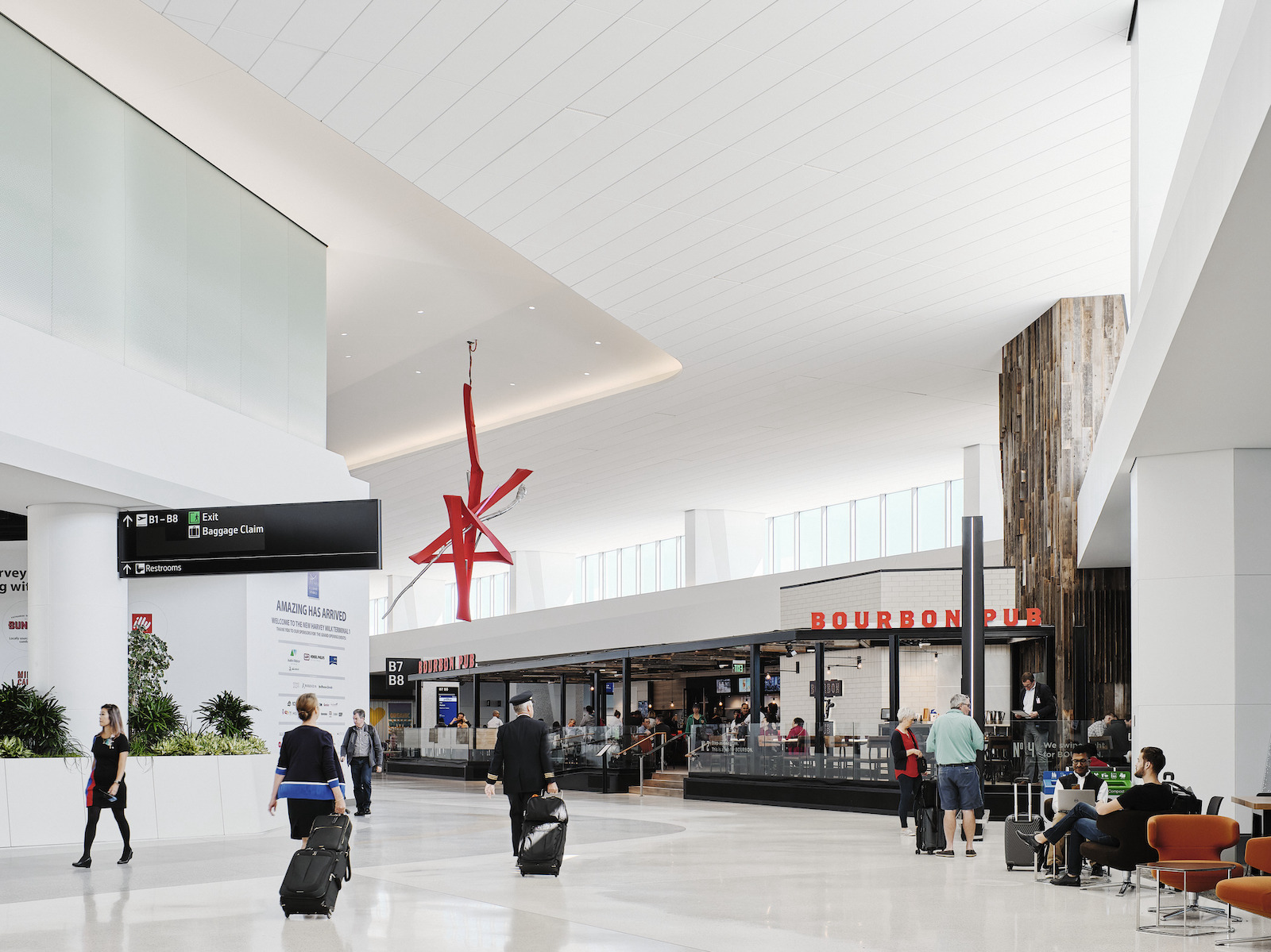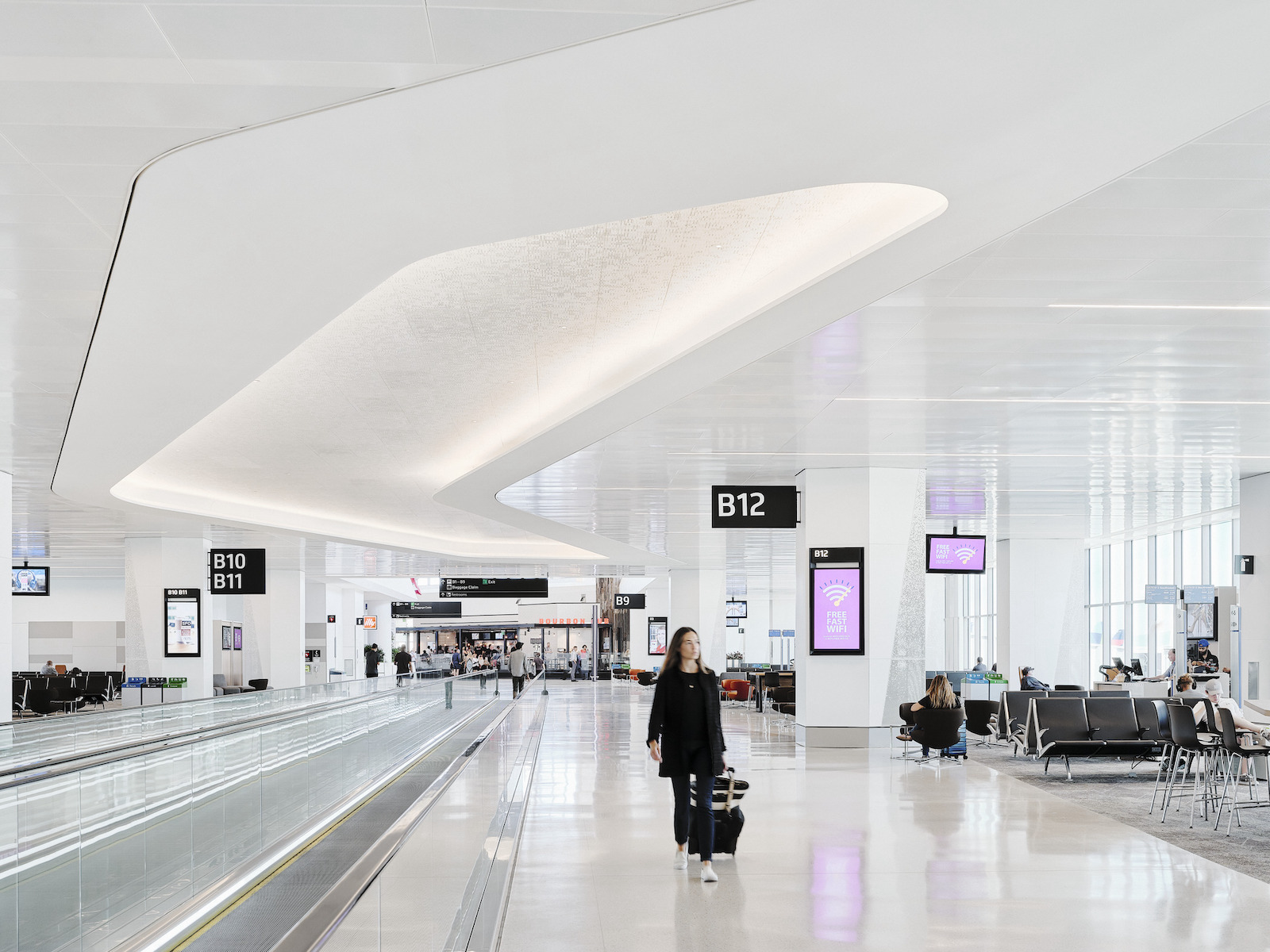The San Francisco International Airport (SFO) announced that Harvey Milk Terminal 1 has become the first airport terminal in the world to earn Platinum certification using the latest standards from the Leadership in Energy and Environmental Design (LEED) program.
The LEED v4 raises the bar for the design, construction, and high-performance structures. SFO earned this certification for Boarding Area B in Harvey Milk Terminal 1. This includes the 25-gate concourse, concession space, and connector to the U.S. Customs Federal Inspection Area.

HIGHLIGHTS OF THE HARVEY MILK TERMINAL PROJECT
- A tote-based Independent Carrier System (ICS) to manage checked baggage, the first in the U.S., which uses 50% less energy and is easier to operate and maintain than previous systems
- Self-energizing (regenerative) elevators recycle energy, rather than wasting it as heat
- Go-Slow escalators and moving walkways that reduce speed when not in use to save energy
- Radiant heating and cooling to complement displacement ventilation to provide energy efficiency, improved indoor air quality and enhanced passenger comfort
- Dynamic glazed windows that change with the sun’s location, to reduce glare and improve comfort
- Large windows harnessing daylight to reduce the need for electric lighting
- Controllable, dimmable, long-life light-emitting diode (LED) fixtures throughout the facility
- Low-flow, hands-free bathroom fixtures and faucets save water in our drought-prone state
- Roof-mounted photovoltaic panels, providing renewable power for the facility
- Highly efficient outdoor air filtration system to remove pollutants and odor to provide healthier indoor environments with minimal efficiency impacts
- Building materials and furnishings with low-volatile organic compound (VOC) emissions
- Selection of products, systems and materials with the least environmental or planetary impact based upon Health Product Declarations (HPDs) and Environmental Product Declarations (EPDS)
- Integrated Building Management System measures energy and water use and adjusts equipment to be more efficient
- Seamless access to all facilities, including public transit, via the AirTrain electric people mover, which eliminated over 600,000 miles of bus trips annually
- Recycling and diversion of approximately 95% of construction waste from landfill

“We are truly proud to be the first airport in the world to earn LEED v4 Platinum certification,” said Airport Director Ivar C. Satero in the release. “This achievement continues a tradition of leadership in sustainable facilities that includes the first LEED Gold airport terminal in the United States, and the world’s first zero net energy facility at an airport. My thanks go out to the entire project team for continuing to push the envelope for what airports can accomplish to support our environmental goals.”
PROJECT TEAM FOCUSED ON COLLABORATION
A collaboration between HKS, Arup, Woods Bagot, ED2 International, Austin Commercial, Webcor, and Kendall Young Associates, the design takes advantage of every innovation available, beginning with repurposing the existing Boarding Area B to achieve the new 225,000-sf building.
Materials and systems were selected based on having the least environmental impact, such as carbon-sequestering concrete and nontoxic carpet tiles and finishes.
Other features include a sophisticated baggage carousel and photovoltaic panels on the roof, which generate the energy required for operations.
The project management team includes:
- BAB Design-builder: Austin Commercial & Webcor Builders Joint Venture with HKS / Woods Bagot / ED2 International / Kendall Young Associates
- BAB Sustainability Coordinator: Arup
- BAB Construction Manager: WSP / AGS
Related Stories
Codes and Standards | Sep 19, 2024
Navigating the intricacies of code compliance and authorities having jurisdiction
The construction of a building entails navigating through a maze of regulations, permits, and codes. Architects are more than mere designers; we are stewards of safety and navigators of code compliance.
Government Buildings | Sep 17, 2024
OSHA’s proposed heat standard published in Federal Register
The Occupational Safety and Health Administration (OSHA) has published a proposed standard addressing heat illness in outdoor and indoor settings in the Federal Register. The proposed rule would require employers to evaluate workplaces and implement controls to mitigate exposure to heat through engineering and administrative controls, training, effective communication, and other measures.
Resiliency | Sep 3, 2024
Phius introduces retrofit standard for more resilient buildings
Phius recently released, REVIVE 2024, a retrofit standard for more resilient buildings. The standard focuses on resilience against grid outages by ensuring structures remain habitable for at least a week during extreme weather events.
Sustainability | Aug 14, 2024
World’s first TRUE Zero Waste for Construction-certified public project delivered in Calif.
The Contra Costa County Administration Building in Martinez, Calif., is the world’s first public project to achieve the zero-waste-focused TRUE Gold certification for construction. The TRUE Certification for Construction program, administered by Green Business Certification Inc. (GBCI), recognizes projects that achieve exceptional levels of waste reduction, reuse, and recycling.
Sustainability | Jul 18, 2024
Grimshaw launches free online tool to help accelerate decarbonization of buildings
Minoro, an online platform to help accelerate the decarbonization of buildings, was recently launched by architecture firm Grimshaw, in collaboration with more than 20 supporting organizations including World Business Council for Sustainable Development (WBCSD), RIBA, Architecture 2030, the World Green Building Council (WorldGBC) and several national Green Building Councils from across the globe.
Codes and Standards | Jul 15, 2024
New York City code update changes definition of a major building
Changes affecting how construction projects in New York City are permitted will have significant impacts for contractors. On Dec. 11, the definition of a major building in the city’s code will change from 10 stories to seven, or 75 feet. The change will affect thousands more projects.
Government Buildings | Jul 8, 2024
GSA adopts new accessibility guidelines for federal properties
The U.S. General Services Administration (GSA) adopted a new rule with new accessibility guidelines for federal buildings. The rule establishes that pedestrian facilities in the public right-of-way are readily accessible to and usable by people with disabilities.
Sustainability | Jul 1, 2024
Amazon, JPMorgan Chase among companies collaborating with ILFI to advance carbon verification
Four companies (Amazon, JPMorgan Chase, JLL, and Prologis) are working with the International Living Future Institute to support development of new versions of Zero Carbon Certification.
K-12 Schools | Jul 1, 2024
New guidelines for securing schools and community spaces released by the Door Security and Safety Foundation
The Door Security and Safety Foundation (DSSF), in collaboration with Door and Hardware Institute (DHI), recently released of “Are Your Door Openings Secure?.” The document provides guidelines to equip school administrators, building management personnel, and community leaders with a clear roadmap to create a secure and safe environment.
Sustainability | Jun 24, 2024
CBRE to use Climate X platform to help clients calculate climate-related risks
CBRE will use risk analysis platform Climate X to provide climate risk data to commercial renters and property owners. The agreement will help clients calculate climate-related risks and return on investments for retrofits or acquisitions that can boost resiliency.

















